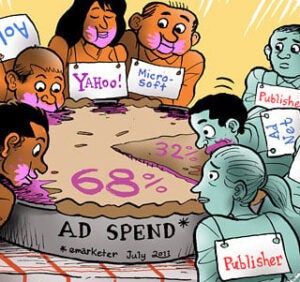 Now trading on NASDAQ: The Trade Desk.
Now trading on NASDAQ: The Trade Desk.
The demand-side platform officially IPO’d on Wednesday morning, with shares trading between $28 and $30, smashing the company’s $16-to-$18-per-share projection (which it amended upward from $14 to $16 the day before its IPO).
The stock price as of approximately 3 p.m. Eastern placed the company’s market cap close to $1 billion.
The IPO likely puts $90 million or more in The Trade Desk’s coffers, and the company plans to make oversized investments in international growth – China in particular – and in programmatic TV buying, said Chief Client Officer Brian Stempeck.
Going public also exposes CEO Jeff Green and company to the harrowing roller coaster of investor relations, as well as the challenge of managing customer relationships in an environment of regulated transparency.
“The Trade Desk is a solid company, but they’ve got a lot of risks that won’t be fully appreciated by most investors because in general investors don’t tend to understand the space,” said Brian Wieser, a senior analyst at Pivotal Research Group.
Its biggest challenges include keeping pace with technology innovation and fee pressure.
“Even if your company’s premise is to be transparent, it doesn’t mean your customers know how profitable you are,” Wieser added.
The Trade Desk’s concentration of revenue among big agencies adds to the risk of compressed fees, according to Wieser. The holding company agencies where The Trade Desk turns its strongest profit are themselves subject to margin pressure in the form of unending fee reductions.
Stempeck said The Trade Desk’s model is distinct from others on the market in ways that make it “a very defensible position.” For instance, no other publicly traded ad tech company has executed the software-as-a-service platform model, he said.
Stempeck said there are others, specifically AppNexus, with a platform approach, but that The Trade Desk’s exclusively demand-side focus is a differentiating feature for holding companies and global agencies.
AdExchanger Daily
Get our editors’ roundup delivered to your inbox every weekday.
Daily Roundup
“We think it’s going to be difficult at end state to make the case for being on both sides of the industry,” said Stempeck, who actively partners with SSPs and inventory sources but counts only agencies as clients. “Because when it comes down to it, are you trying to get the best rate for the buyer or are you trying to get the best yield for the publisher?”
The whole public ad tech sector has had weak performance, “which creates something of an overhang,” said Wieser. He doesn’t expect other ad tech businesses to line up to IPO regardless of The Trade Desk’s performance – except for perennial IPO contender AppNexus – but said startups, agencies and investors do hope a hit IPO could move the industry forward.
“I think the reaction you’re seeing from the market is people saying, ‘hey, let’s have another look at the ad tech category,’” said Stempeck. “Investors had gotten away from an industry they used to love, but the fundamentals are still there when you consider what percent of global ad spend is bought programmatically today versus what will be programmatic five or ten years from now.”
And indeed, many industry stakeholders are pulling for The Trade Desk to buck the general ad tech stock trend (which is to say down).














